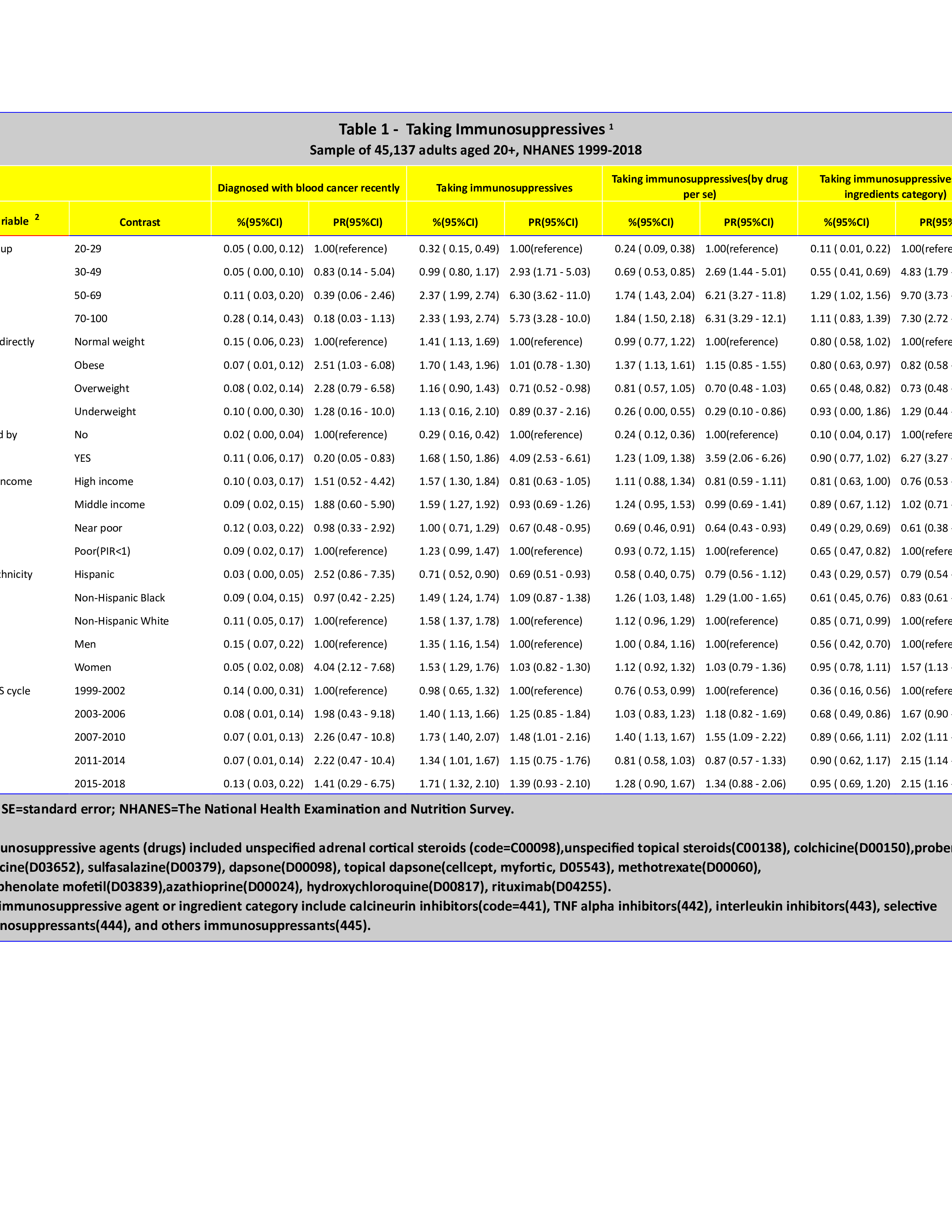Session Information
Session Type: Poster Session C
Session Time: 10:30AM-12:30PM
Background/Purpose: Recent data from the 2021 National Health Interview Survey (NHIS) reveals a marked increase in the percentage of adults using immunosuppression. However, data from NHANES (The National Health and Nutrition Examination Survey) may generate more reliable estimations since NHANES asks participants to bring their prescription and over-the-counter medication bottles with them (for review by the interviewer).
Methods: We used the data collected from National Health and Nutrition Examination Survey 1999-2002 (n=8,188), 2003-2006(n=8,623), 2007-2010(10,123), 2011-2014 (n=8,473), 2015-2018 (n=7,828). Participants were nationally representative samples of the U.S. non-institutionalized civilian population. We defined immunosuppressant use as the use of any of the following medications in the preceding month: adrenal cortical steroids, topical steroids, colchicine, probenecid colchicine, sulfasalazine, dapsone, topical dapsone (Cellcept, mystic), methotrexate, mycophenolate mofetil, azathioprine, hydroxychloroquine, and rituximab. The immunosuppressive ingredient categories, such as calcineurin inhibitors, were also used to identify the users of immunosuppressants. We estimated the prevalence of immunosuppressant use and determined predictors of use using multivariate logistic regression.
Results: Overall, 1.44% (95%CI=1.29%, 1.59%) of adults used immunosuppressants within the preceding month. Overall immunosuppressant use increased between 1999-2004 and 2015-2018, the percentages of using immunosuppressants were 0.98% (0.65%, 1.32%), 1.40% ( 1.13%, 1.66%), 1.73% ( 1.40%, 2.07%), 1.34% (1.01%, 1.67%), 1.71% ( 1.32%, 2.10%) respectively for the survey years 1999-2004, 2005-2008, 2009-2014, and 2015-2018. The prevalence of using immunosuppressants with 4 major ingredients, calcineurin inhibitors, TNF alpha inhibitors, interleukin inhibitors(443), and selective immunosuppressants, increased from 0.36% ( 0.16%, 0.56%) in 1999-2002, 0.68% ( 0.49%, 0.86%) in 2003-2006, and 0.89% ( 0.66%, 1.11%) in 2007- 2010 to 0.90% ( 0.62%, 1.17%) in 2011-2014, and 0.95% ( 0.69%, 1.20%) in 2015-2018, almost tripled. After adjustment for age, sex, and medical insurance coverage, the prevalence ratio of using immunosuppressants with 4 major ingredients were 1.00(reference), 1.67 (0.90, 3.11), 2.02 (1.11, 3.66), 2.15 (1.14, 4.06) and 2.15 (1.16 – 4.00) respectively for 5 survey cycles from 1999-2004 to 2015-2018. obesity was found to be associated with newly diagnosed blood cancer, increased likelihood of using immunosuppressives, the prevalence ratios were 2.51 (1.03, 6.08), and 2.28 (0.79 – 6.58) for being obese and overweight, suggesting a possible reason behind the increasing trend of immunosuppressants mirroring the rising trend in obesity.
Conclusion: In this nationally representative sample, reported prescription medications commonly used as immunosuppressants within the preceding month were less prevalent than previously reported. However, the increasing trend in using immunosuppressants was confirmed in the current report.
To cite this abstract in AMA style:
Edwards Q, Qotineh A, Okeke C, Zhang J. The National Trend of Using Prescription Immunosuppressives [abstract]. Arthritis Rheumatol. 2024; 76 (suppl 9). https://acrabstracts.org/abstract/the-national-trend-of-using-prescription-immunosuppressives/. Accessed .« Back to ACR Convergence 2024
ACR Meeting Abstracts - https://acrabstracts.org/abstract/the-national-trend-of-using-prescription-immunosuppressives/

